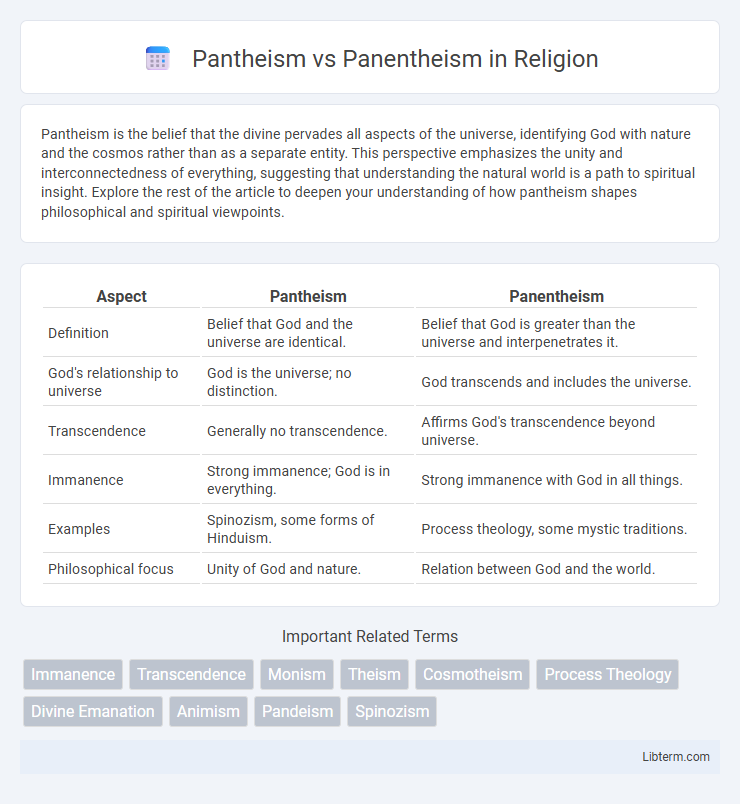Pantheism is the belief that the divine pervades all aspects of the universe, identifying God with nature and the cosmos rather than as a separate entity. This perspective emphasizes the unity and interconnectedness of everything, suggesting that understanding the natural world is a path to spiritual insight. Explore the rest of the article to deepen your understanding of how pantheism shapes philosophical and spiritual viewpoints.
Table of Comparison
| Aspect | Pantheism | Panentheism |
|---|---|---|
| Definition | Belief that God and the universe are identical. | Belief that God is greater than the universe and interpenetrates it. |
| God's relationship to universe | God is the universe; no distinction. | God transcends and includes the universe. |
| Transcendence | Generally no transcendence. | Affirms God's transcendence beyond universe. |
| Immanence | Strong immanence; God is in everything. | Strong immanence with God in all things. |
| Examples | Spinozism, some forms of Hinduism. | Process theology, some mystic traditions. |
| Philosophical focus | Unity of God and nature. | Relation between God and the world. |
Understanding Pantheism: Definition and Origins
Pantheism is the belief that God and the universe are identical, implying that everything collectively composes an all-encompassing, immanent deity. This worldview originates from ancient philosophical traditions, with roots in Stoicism and early Eastern religions, emphasizing the unity and divinity of nature. Understanding pantheism involves recognizing its emphasis on the divine presence within all aspects of the cosmos, contrasting with the concept of a personal, transcendent god.
Exploring Panentheism: Meaning and Historical Background
Panentheism is a metaphysical belief system that posits God or the divine exists within and extends beyond the universe, combining immanence and transcendence in a unique way. Tracing its roots to ancient philosophical traditions and further developed by thinkers like Friedrich Schleiermacher and process theologians, panentheism offers an alternative to classical theism and pantheism by emphasizing a dynamic relationship between the divine and the cosmos. This framework influences contemporary discussions in theology, philosophy, and environmental ethics by highlighting the interconnectedness of all existence while acknowledging a transcendent divine presence.
Core Philosophical Differences
Pantheism identifies God as synonymous with the universe, asserting that everything collectively constitutes a divine entity without distinction between creator and creation. Panentheism posits that God transcends and interpenetrates the universe simultaneously, existing both within all things and extending beyond them. The core philosophical difference lies in pantheism's emphasis on God being entirely immanent, whereas panentheism integrates both immanence and transcendence in the divine nature.
Theological Implications of Each View
Pantheism identifies God with the universe, implying a theologically immanent deity without transcendence, which challenges traditional notions of a personal, interventionist God. Panentheism posits God as both immanent within creation and transcendent beyond it, enabling a dynamic relationship between divinity and the cosmos. This theological framework supports concepts of divine presence, ongoing creation, and the potential for human participation in the divine life.
Concept of God in Pantheism vs Panentheism
Pantheism identifies God with the universe, asserting that everything collectively is divine and that God is immanent in all things without transcendence. Panentheism posits that God encompasses and interpenetrates the universe while also existing beyond it, combining immanence with transcendence. This distinction highlights pantheism's view of God as synonymous with the cosmos, whereas panentheism maintains a Supreme Being both within and surpassing creation.
Relationship Between God and the Universe
Pantheism identifies God as synonymous with the universe, asserting that everything collectively forms the divine essence without distinction. Panentheism posits that God includes and transcends the universe, existing both within it and beyond its limits, allowing for a dynamic relationship where the divine encompasses all creation but is not limited by it. This distinction highlights pantheism's emphasis on unity and panentheism's focus on a greater, both immanent and transcendent, divine reality.
Famous Thinkers and Proponents
Famous thinkers associated with pantheism include Baruch Spinoza, who equated God with the nature and universe, and Giordano Bruno, known for his belief in an infinite divine cosmos. Panentheism, blending elements of theism and pantheism, was notably supported by philosophers like Alfred North Whitehead, who introduced process theology, and Charles Hartshorne, who emphasized a God that interpenetrates yet transcends the universe. These proponents shaped theological and philosophical discourse by exploring the relationship between divinity and the cosmos in nuanced ways.
Pantheism and Panentheism in World Religions
Pantheism identifies the divine with the universe itself, emphasizing the immanence of God in all things, a concept central to some interpretations of Hinduism and certain strands of Taoism. Panentheism, which posits that the divine pervades the universe yet also transcends it, has significant representation in Christian mysticism and certain Indigenous spiritual traditions. Both perspectives influence religious cosmologies by framing the relationship between the divine and the cosmos, shaping diverse theological and philosophical understandings across world religions.
Contemporary Debates and Criticisms
Contemporary debates on Pantheism versus Panentheism center on their distinct views of divinity's relationship with the universe; Pantheism equates God with the cosmos entirely, while Panentheism posits God as both immanent in and transcendent beyond creation. Critics argue Pantheism risks reducing God to a mere natural force, undermining transcendence and personal deity aspects emphasized in Panentheism. Panentheism faces challenges over its complex metaphysical claims, with some scholars questioning the coherence of a God who simultaneously pervades and exceeds the universe's boundaries.
Practical Impacts on Spirituality and Worldview
Pantheism, which identifies God with the universe, encourages a spirituality that emphasizes unity with nature and the cosmos, fostering a sense of interconnectedness and reverence for the natural world. Panentheism, asserting that the divine permeates the universe while also transcending it, inspires a worldview that balances immanence and transcendence, promoting both personal transformation and ethical responsibility toward creation. These theological perspectives shape practical spirituality by influencing environmental ethics, meditation practices, and the understanding of human purpose within the cosmos.
Pantheism Infographic

 libterm.com
libterm.com